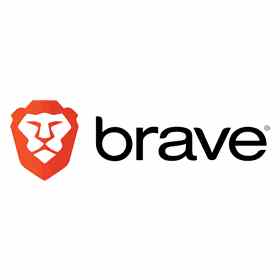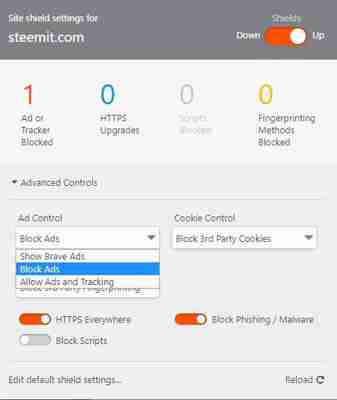The Internet is a vast sea of information, social media, news, downloadable content, forums, bloggers and yes, cat videos, from all across the globe. So if the Internet is the sea, then your browser is your sailing vessel. Much like choosing a good boat, your browser’s got to be reliable, safe, fast, and versatile.

And that makes Brave the pride of the fleet.
If you haven’t heard of Brave before, it’s probably because the first stable release hit the internet for iOS back in early August. Now it’s available on iOS, Android, macOS, Windows, and Linux. Despite its only-recent foray, the software was actually developed (by Brave Software ) and founded as far back as May 2015. The coolest part? It was founded by Brian Bondy and Brendan Eich , Eich being the inventor of JavaScript and the co-founder of Mozilla Firefox .
Brave is open source and has been built by a team that’s focused on privacy and performance. “It’s more than a browser;” says Eich, “it’s a new system for properly valuing user attention.” How does it accomplish this? Let’s dive in.

Protection and privacy are paramount
Right off the bat, Brave automatically blocks any and all trackers . That means anything that could cramp your browsing style like cookies, pop-ups, ads, demographic targets , and location settings – none of that even makes it past the first line of defense. After that first line of defense, the rest is up to the user:
Brave’s shield customization and firewall settings allow for extensive fine-tuning of what gets through the net. If you want to block cookies, you got it. If you want to allow them, that’s fine too. If you only want to block third-party cookies, that’s an option as well.

The same level of highly organic protection applies to Brave’s script blocking, fingerprinting protection, payment methods, addresses, passwords, trackers, and practically everything else. There’s even an innate function that automatically upgrades your existing connection to an HTTPS protocol, making sure you get the highest level of security that a site can offer.
If this sounds like a lot of ruckus about pop-up ads, you’re not seeing the bigger picture. This is about so much more than just blocking ads or getting faster load times.
The problem with ads on sites
If you own a smartphone and you use it to browse the internet, a chunk of that bandwidth that you’re paying to receive is being spent on loading a bunch of superfluous garbage that you never asked for and would never want. It’s waved in front of you in the form of cookies, trackers, and ads. “It’s hard to believe,” says Eich, “but we’re paying to be bothered by ads!” According to the New York Times even as far back as 2015 that sum amounts to about $23 a month – $276 a year! – for your browser to load minutiae that you didn’t want to see anyway.
Popular media sites can have as many as 70 trackers , all vying for your attention at once, taking your bandwidth, costing you the money you spend on bandwidth, and drastically slowing down the loading times of websites. We started using Brave as soon as we heard about it, and it honestly feels like driving with an EZ Pass, seeing all the poor souls stuck on a congested highway while you zip along to your destination.
Brave loads freakishly fast
Google Chrome is possibly the fastest browser around, but it accomplishes this by drawing upon more of your desktop’s RAM . Chrome’s ad filtering has gotten harsher this year , and is a welcome improvement. Slap an ad blocker on Chrome and you’ll have less harassment from pop-ups and trackers, but you might also accidentally block more than just ads:
YouTube and Intercom, for example, are often erroneously blocked. Additionally, there’s also the chance that you’re hurting the livelihood and income of fledgling sites and business that are dependent on those ads to generate income. While the average user may not care, it could ultimately affect the amount of free content available from places like news sites, forums, or blogs.
Brave loads fast. How fast? On a laptop or desktop, you’ll see load times anywhere from 50% to 100% faster. It’s even more noticeable on mobile devices, and you could be seeing pages load up to eight times faster than on your smartphone’s default browser (i.e. Safari or Chrome).
What’s so astonishing about this, though, is that Brave is able to accomplish this without being more taxing on your computer. Brave does not eat up as much RAM as Chrome, and requires less CPU and less memory. It’s not as bloated, and still matches (and even surpasses ) the speed of Chrome. And it does this without adding cumbersome or faulty ad blockers; it’s all there by default.
Blockchain advertising
That still doesn’t solve the problem of ad blocking being harmful to a website’s economy . Brave thought of this, too, and proposed a radical idea: Brave employs a ledger system that rewards sites based on user attention. It then attempts to decentralize ad exchange, meaning that should you accept advertisement from a publisher, that relationship (and subsequent profit) will remain between the two of you; none of it goes to third-party sources or middlemen.
In layman’s terms, it works like this: You never have to look at push banners, pop-ups, or advertisements with Brave. Period. But if you choose to, then both the user and the publisher of the content are appropriately rewarded. This concept called for a new form of currency – Brave’s new Basic Attention Token .
Basic Attention Tokens
If you choose to accept advertisements (and again you never have to with Brave), then you’ll receive Basic Attention Tokens (BATs) each time you choose to view them. “The token is derived from, and therefore denominates, user attention,” explains Eich.
Brave will monitor your attention as you view pages and tabs, and does so both accurately and privately. It then compiles the time (and attention) you gave these ads, and rewards you with digital tokens. “That’s really just focused mental engagement – on an advertisement, on great content, on whatever the user is looking at.” The result is far fewer instances of fraudulent marketing and malvertising.
So Brave keeps your personal data??
Actually no, they don’t .
Your data (like search history or bookmarks) is all local. Brave’s servers never see or store any of it. That information stays on your own device until you decide to delete it. Brave never sells your personal data to third parties.
So then where do these tokens go?
Short answer: To the publishers of the content.
When an ad is viewed, tokens are given to both you and the publishers. As a user, you have the power to pay BATs to a publisher you support. It’s a way to more reliably and directly engage with them, and more accurately distribute your ‘monetized attention’ toward your chosen candidates.
The result is that you essentially now get to choose who receives your attention . It’s certainly better than being forced to watch the same commercial for something you don’t want dozens of times in a row; your bandwidth money is going towards it either way.
The neat part about the BAT system is that when you pay a publisher with these tokens, they can then reward users in various ways – ads more tailored to your preference, or even discounts for that publisher’s products. Sites can also elect to charge BATs for premium content, which means that you’re effectively getting rewarded for your attention.
Give back to the sites you frequent
Brave has an integrated (but completely optional) Brave Rewards system. With this engaged, you can choose a contribution amount that works for you – something like a few dollars a month to divide among your favorite sites and content creators. It’s a way to promote the sites and publishers that you like. If that sounds like too much micro-managing you can choose for Brave to do it for you – distributing your contributions automatically, based on the sites you spend the most time on.
If you choose to use Brave Rewards, know that your browsing history will still always be private. Brave’s anonymous ledger system allows your funding to be made available to your chosen site owners, but still keeps you unidentifiable. If this sounds like a feature you’d be interested in, you’ll be happy to know over 10 thousand content creators and publishers have already registered to receive Brave Rewards.
If all this doesn’t sound like a feature you’d like, no worries! Simply browsing on Brave is 100% free , and you can always elect to do so without any ads at all. It’s really all up to your preference.
If you’re unsure whether Brave is the right browser for you, we recommend installing it and seeing for yourself . The download and installation is completely free , and we’ll walk you through it right here.
See you on the net!